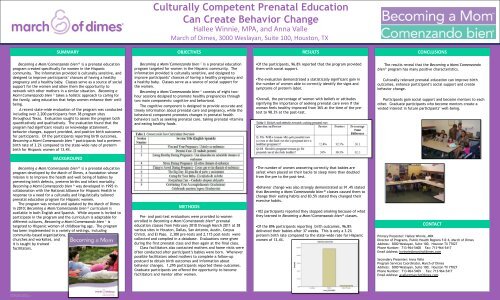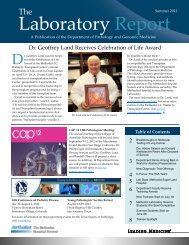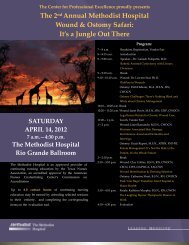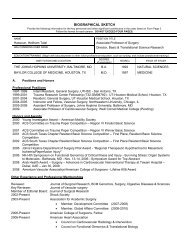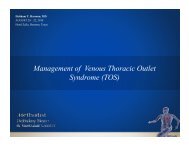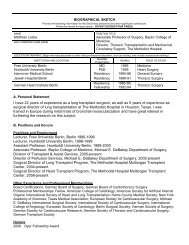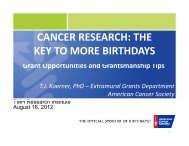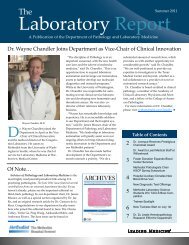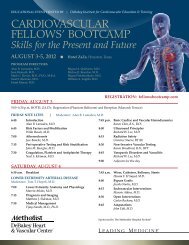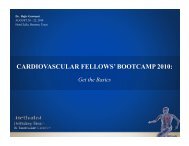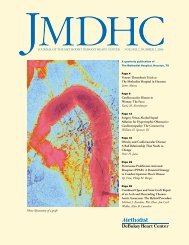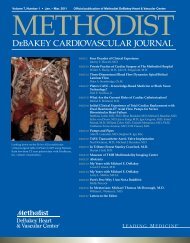Hallee Winnie, MPA, And Anna Valle
Hallee Winnie, MPA, And Anna Valle
Hallee Winnie, MPA, And Anna Valle
You also want an ePaper? Increase the reach of your titles
YUMPU automatically turns print PDFs into web optimized ePapers that Google loves.
RESEARCH POSTER PRESENTATION DESIGN © 2011<br />
www.PosterPresentations.com<br />
SUMMARY<br />
Becoming a Mom/Comenzando bien is a prenatal education<br />
program created specifically for women in the Hispanic<br />
community. The information provided is culturally sensitive, and<br />
designed to improve participants’ chances of having a healthy<br />
pregnancy and a healthy baby. Classes serve as a source of social<br />
support for the women and allow them the opportunity to<br />
network with other mothers in a similar situation. Becoming a<br />
Mom/Comenzando bien takes a holistic approach to caring for<br />
the family, using education that helps women enhance their wellbeing.<br />
A recent state-wide evaluation of the program was conducted<br />
including over 2,200 participants from 38 program sites<br />
throughout Texas. Evaluation sought to assess the program both<br />
quantitatively and qualitatively. The evaluation found that the<br />
program had significant results on knowledge attainment,<br />
behavior changes, support provided, and positive birth outcomes<br />
for participants. Of the participants reporting birth outcomes,<br />
Becoming a Mom/Comenzando bien participants had a preterm<br />
birth rate of 3.2% compared to the state-wide rate of preterm<br />
birth for Hispanic women of 13.4%.<br />
BACKGROUND<br />
Becoming a Mom/Comenzando bien is a prenatal education<br />
program developed by the March of Dimes, a foundation whose<br />
mission is to improve the health and well being of babies by<br />
preventing birth defects, preterm births and infant mortality.<br />
Becoming a Mom/Comenzando bien was developed in 1995 in<br />
collaboration with the National Alliance for Hispanic Health in<br />
response to a need for a culturally and linguistically tailored<br />
prenatal education program for Hispanic women.<br />
The program was revised and updated by the March of Dimes<br />
in 2010; Becoming a Mom/Comenzando bien curriculum is<br />
available in both English and Spanish. While anyone is invited to<br />
participate in the program and the curriculum is adaptable for<br />
different cultures, Becoming a Mom/Comenzando bien is<br />
targeted to Hispanic women of childbearing age. The program<br />
has been implemented in a variety of settings, including<br />
community-based organizations,<br />
churches and worksites, and<br />
it is taught by trained<br />
facilitators.<br />
Culturally Competent Prenatal Education<br />
Can Create Behavior Change<br />
<strong>Hallee</strong> <strong>Winnie</strong>, <strong>MPA</strong>, and <strong>Anna</strong> <strong>Valle</strong><br />
March of Dimes, 3000 Weslayan, Suite 100, Houston, TX<br />
OBJECTIVES<br />
Becoming a Mom/Comenzando bien is a prenatal education<br />
program targeted for women in the Hispanic community. The<br />
information provided is culturally sensitive, and designed to<br />
improve participants’ chances of having a healthy pregnancy and<br />
a healthy baby. Classes serve as a source of social support for<br />
the women.<br />
Becoming a Mom/Comenzando bien consists of eight twohour<br />
sessions designed to promote healthy pregnancies through<br />
two main components: cognitive and behavioral.<br />
The cognitive component is designed to provide accurate and<br />
timely information about prenatal care and pregnancy, while the<br />
behavioral component promotes changes in prenatal health<br />
behaviors such as seeking prenatal care, taking prenatal vitamins<br />
and eating healthy foods.<br />
METHODS<br />
Pre- and post-test evaluations were provided to women<br />
enrolled in Becoming a Mom/Comenzando bien prenatal<br />
education classes from February 2010 through March 2011 at 38<br />
various sites in Houston, Dallas, San Antonio, Austin, Corpus<br />
Christi, and El Paso. 2,300 pre-tests and 2,115 post-tests were<br />
collected and compiled in a database. Evaluations were given<br />
during the first prenatal class and then again at the final class.<br />
Class facilitators also contacted mothers and home visits were<br />
often conducted after participant’s babies were born. Whenever<br />
possible facilitators asked mothers to complete a follow-up<br />
postcard to obtain birth outcomes and information about<br />
behavior changes. 1,295 participants reported these outcomes.<br />
Graduate participants are offered the opportunity to become<br />
facilitators and mentor other women.<br />
RESULTS CONCLUSIONS<br />
•Of the participants, 96.8% reported that the program provided<br />
them with social support.<br />
•The evaluation demonstrated a statistically significant gain in<br />
the number of women able to correctly identify the signs and<br />
symptoms of preterm labor.<br />
•Overall, the percentage of women with beliefs or attitudes<br />
signifying the importance of seeking prenatal care even if the<br />
woman feels healthy improved from 36% at the time of the pretest<br />
to 98.3% at the post-test.<br />
•The number of women answering correctly that babies are<br />
safest when placed on their backs to sleep more than doubled<br />
from the pre to the post-test.<br />
•Behavior change was also strongly demonstrated as 91.4% stated<br />
that Becoming a Mom/Comenzando bien classes caused them to<br />
change their eating habits and 83.5% stated they changed their<br />
exercise habits.<br />
•102 participants reported they stopped smoking because of what<br />
they learned in Becoming a Mom/Comenzando bien classes.<br />
•Of the 896 participants reporting birth outcomes, 96.8%<br />
delivered their babies after 37 weeks. This is only a 3.2%<br />
preterm birth rate compared to the state-wide rate for Hispanic<br />
women of 13.4%.<br />
The results reveal that the Becoming a Mom/Comenzando<br />
bien program has many positive characteristics.<br />
Culturally relevant prenatal education can improve birth<br />
outcomes, enhance participant’s social support and create<br />
behavior change.<br />
Participants gain social support and become mentors to each<br />
other. Graduate participants who become mentors create a<br />
vested interest in future participants’ well-being.<br />
CONTACT<br />
Primary Presenter: <strong>Hallee</strong> <strong>Winnie</strong>, <strong>MPA</strong><br />
Director of Programs, Public Health Regions 5 & 6, March of Dimes<br />
Address: 3000 Weslayan, Suite 100, Houston TX 77027<br />
Phone Number: 713-964-5408 Fax: 713-964-5417<br />
Email Address: hwinnie@marchofdimes.com<br />
Secondary Presenter: <strong>Anna</strong> <strong>Valle</strong><br />
Program Services Coordinator, March of Dimes<br />
Address: 3000 Weslayan, Suite 100, Houston TX 77027<br />
Phone Number: 713-964-5409 Fax: 713-964-5417<br />
Email Address: avalle@marchofdimes.com
Culturally Competent Prenatal Education Can Create Behavior Change<br />
Becoming a Mom/Comenzando bien is a prenatal education program created specifically for women in the Hispanic<br />
community. The information provided is culturally sensitive, and designed to improve participants’ chances of having a<br />
healthy pregnancy and a healthy baby. Classes serve as a source of social support for the women and allow them the<br />
opportunity to connect with other mothers in a similar situation. Becoming a Mom/Comenzando bien takes a holistic<br />
approach to caring for the family, using education that helps women enhance their well-being.<br />
Becoming a Mom/Comenzando bien curriculum is available in both English and Spanish. While anyone is invited to<br />
participate in the program and the curriculum is adaptable for different cultures, Becoming a Mom/Comenzando bien<br />
is targeted to Hispanic women of childbearing age. The program has been implemented in a variety of settings,<br />
including community-based organizations, churches and worksites, and it is taught by trained facilitators.<br />
The program consists of eight two-hour sessions designed to promote healthy pregnancies through two components:<br />
� Cognitive - designed to provide accurate and timely information about prenatal care and pregnancy.<br />
� Behavioral - component promotes changes in prenatal health behaviors such as seeking prenatal care, taking<br />
prenatal vitamins and eating healthy foods.<br />
From February 2010 through March 2011, 2,330 pre-tests and 2,115 post-tests were collected from enrolled in<br />
Becoming a Mom/Comenzando bien prenatal education classes. 1,295 participants completed follow-up postcards<br />
reporting birth outcomes and information regarding behavior changes. Results from the evaluation include:<br />
� 96.8% reported that the program provided them with social support.<br />
� Statistically significant gain in the number of women able to correctly identify the signs and symptoms of<br />
preterm labor.<br />
� The percentage of women with beliefs or attitudes signifying the importance of seeking prenatal care even if the<br />
woman feels healthy improved from 36% at the time of the pre-test to 98.3% at the post-test.<br />
� 91.4% stated that Becoming a Mom/Comenzando bien classes caused them to change their eating habits and<br />
83.5% stated they changed their exercise habits.<br />
� 102 participants reported they stopped smoking because of what they learned in Becoming a<br />
Mom/Comenzando bien classes.<br />
� Of the 896 participants reporting birth outcomes, 96.8% delivered their babies after 37 weeks. This is only a<br />
3.2% preterm birth rate compared to the state-wide rate for Hispanic women of 13.4%.<br />
Becoming a Mom/Comenzando bien has shown culturally relevant prenatal education can improve birth outcomes,<br />
enhance participant’s social support and create behavior change. Participants gain social support and become mentors<br />
to each other. Graduate participants who become mentors create a vested interest in future participants’ well-being.<br />
For more information, contact:<br />
<strong>Hallee</strong> <strong>Winnie</strong>, Director of Programs, Public Health Regions 5 & 6, hwinnie@marchofdimes.com<br />
<strong>Anna</strong> <strong>Valle</strong>, Program Services Coordinator, avalle@marchofdimes.com


